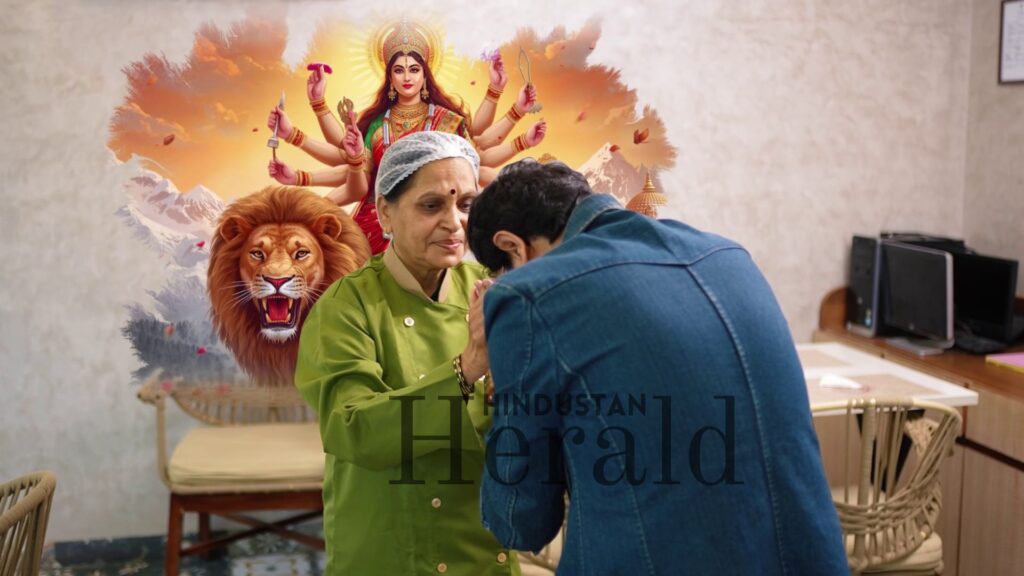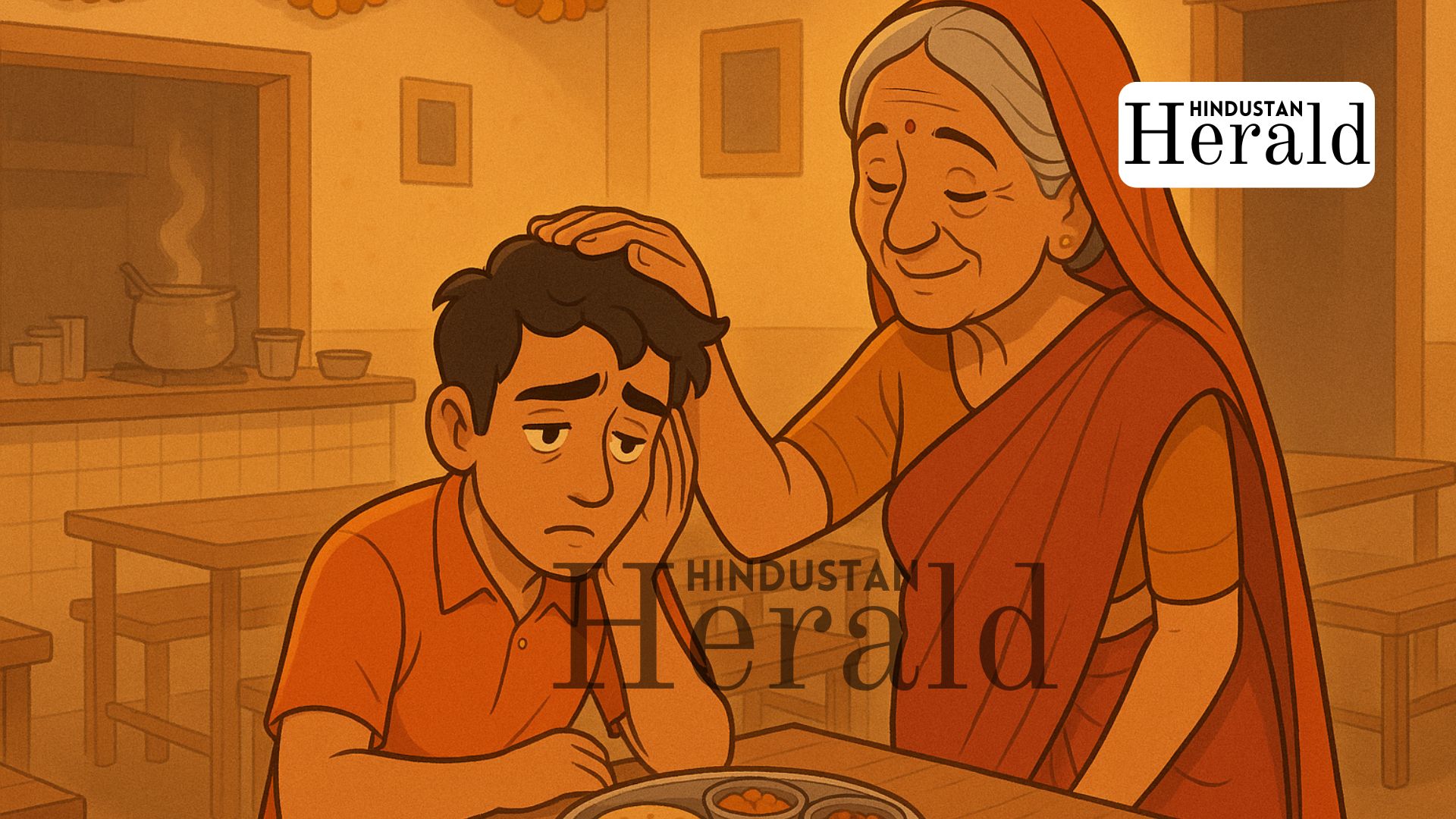Indore, September 25: Every festival season throws up its share of viral videos. Most come and go with the algorithm, but once in a while, something cuts through the noise. This Navratri, that moment has arrived from Indore. Not through a celebrity dance reel or a glossy advertisement, but through a small, heartfelt story of a boy, a stranger, and a blessing that feels larger than life.
The clip, crafted by local podcaster RJ Navneet and backed by Dave Premium Spices, has been quietly making its way across Instagram and WhatsApp groups. The premise is simple enough: a young man, broke and disheartened, finds himself in a modest eatery. He eats in silence, head down, carrying the look of someone who has been fighting battles nobody sees. The woman running the place notices. She doesn’t interrogate him, doesn’t hand him a lecture, just puts her hand on his head and says, almost casually, “Soon, you’ll find a job in a big city.”
The next day, the boy does. A job offer arrives. His first instinct is not to celebrate in isolation but to run back to the aunty who gave him that unlikely blessing. And it’s here that the story twists again, leaving viewers with a lump in their throat. The closing frame dedicates the video to “all the mothers” who feed children not born to them, who extend care and blessings to strangers, who stand in as family for those adrift in new cities.
The other message is almost an echo of our cultural DNA: good deeds, done with the right intent, circle back in ways we can’t predict.
Why It Works
On paper, the storyline borders on idealistic. In real life, jobs don’t materialise overnight. Yet the video resonates because it speaks to an experience millions know intimately, living away from home. Students, migrant workers, and young professionals in unfamiliar towns. For them, the absence of home-cooked food and a mother’s touch is the sharpest reminder of distance. A blessing from a stranger, especially one who feels like a stand-in for home, carries weight far beyond the literal.

The release during Navratri is no accident either. The festival is dedicated to the divine feminine, to maternal strength and protection. To watch a boy stumble into hope thanks to a motherly figure in an eatery feels, in this context, like more than a coincidence.
The Brand in the Background
What makes this piece unusual is its sponsor. Dave Premium Spices, a homegrown food brand, is not selling masala directly here. No recipe shots, no aggressive logos. Instead, they’ve hitched their wagon to an emotion: “Accha khao, accha khilao”, eat well, feed well.
Ishan Dave, the company’s marketing head, has said that the brand genuinely believes in the idea that goodness in food and goodness in action are intertwined. It’s clever, of course, but it also feels fitting. Spices carry memory. They are tied to kitchens, to mothers, to the comfort of familiarity. By attaching their name to this film, the brand isn’t shouting; it’s nodding.
This is where modern advertising is drifting: toward stories that make you feel first, and remember the brand later.
A Reflection of Real Life
Strip away the polish, and what remains is a quiet tribute to an often invisible network of women. The hostel mess lady who sneaks in an extra roti. The tea-stall aunty who knows when a boy has had a rough day. The neighbourhood landlady who insists you eat before leaving for an exam. These small gestures rarely make it to headlines, yet for those on the receiving end, they are lifelines.
In some ways, the video functions as a mirror. It forces viewers to think of their own journeys away from home, and the people who filled the gaps their mothers left behind. It’s nostalgia, but also gratitude.
Not Without Questions
Of course, the cynic in all of us stirs. Can a video like this oversimplify the harshness of life? Certainly. For every boy who lands a job the next day, there are thousands still waiting. And yes, the commercial link nags at the edges. Is this genuine storytelling or a marketing ploy wrapped in sentiment?
But then again, isn’t that the deal we strike every time we engage with branded content? If the message is kind, if it nudges us toward empathy, maybe the transaction is worth it.
The Larger Trend
What happened here is part of a bigger shift. Brands are increasingly abandoning the hard sell in favour of emotional narratives. A soap ad that’s really about self-confidence. A spice ad that’s really about mothers. These stories don’t just hawk products; they build cultural presence.
Expect to see more of this in the years ahead. More localised tales, more ordinary characters, more attempts to weave commerce with compassion. The lines will blur further, and audiences will keep choosing what feels authentic.
A Small Story, A Wide Echo
At its heart, this Indore video isn’t trying to solve social inequality or rewrite the migrant experience. It’s telling a small, specific story. A boy who needed hope, and a woman who gave it freely.
That’s enough to make it travel. That’s enough to remind people of the power of a mother’s touch, whether it comes from the woman who raised you, or from an aunty running a roadside eatery. And perhaps that’s why, in the noise of festival reels, this one stands taller. It makes you pause, smile, and maybe even call home.
Stay ahead with Hindustan Herald — bringing you trusted news, sharp analysis, and stories that matter across Politics, Business, Technology, Sports, Entertainment, Lifestyle, and more.
Connect with us on Facebook, Instagram, X (Twitter), LinkedIn, YouTube, and join our Telegram community @hindustanherald for real-time updates.
Regional journalist bringing grassroots perspectives and stories from towns and cities across India.






